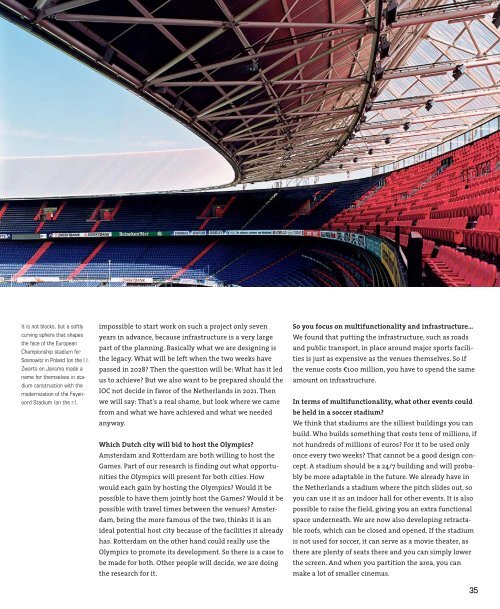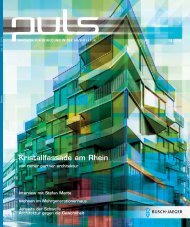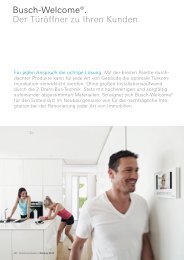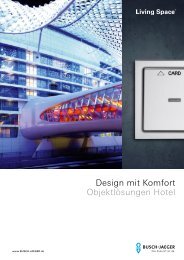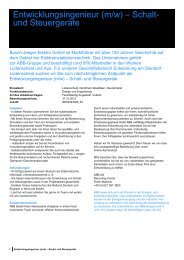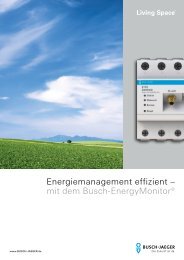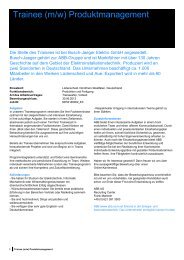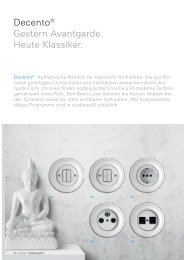Sports complexes that build identity - Busch-Jaeger Elektro GmbH
Sports complexes that build identity - Busch-Jaeger Elektro GmbH
Sports complexes that build identity - Busch-Jaeger Elektro GmbH
You also want an ePaper? Increase the reach of your titles
YUMPU automatically turns print PDFs into web optimized ePapers that Google loves.
It is not blocks, but a softly<br />
curving sphere <strong>that</strong> shapes<br />
the face of the European<br />
Championship stadium for<br />
Sosnowitz in Poland (on the l.).<br />
Zwarts en Jansma made a<br />
name for themselves in stadium<br />
construction with the<br />
modernization of the Feyenoord<br />
Stadium (on the r.).<br />
impossible to start work on such a project only seven<br />
years in advance, because infrastructure is a very large<br />
part of the planning. Basically what we are designing is<br />
the legacy. What will be left when the two weeks have<br />
passed in 2028? Then the question will be: What has it led<br />
us to achieve? But we also want to be prepared should the<br />
IOC not decide in favor of the Netherlands in 2021. Then<br />
we will say: That's a real shame, but look where we came<br />
from and what we have achieved and what we needed<br />
anyway.<br />
Which Dutch city will bid to host the Olympics?<br />
Amsterdam and Rotterdam are both willing to host the<br />
Games. Part of our research is finding out what opportunities<br />
the Olympics will present for both cities. How<br />
would each gain by hosting the Olympics? Would it be<br />
possible to have them jointly host the Games? Would it be<br />
possible with travel times between the venues? Amsterdam,<br />
being the more famous of the two, thinks it is an<br />
ideal potential host city because of the facilities it already<br />
has. Rotterdam on the other hand could really use the<br />
Olympics to promote its development. So there is a case to<br />
be made for both. Other people will decide, we are doing<br />
the research for it.<br />
So you focus on multifunctionality and infrastructure…<br />
We found <strong>that</strong> putting the infrastructure, such as roads<br />
and public transport, in place around major sports facilities<br />
is just as expensive as the venues themselves. So if<br />
the venue costs €100 million, you have to spend the same<br />
amount on infrastructure.<br />
In terms of multifunctionality, what other events could<br />
be held in a soccer stadium?<br />
We think <strong>that</strong> stadiums are the silliest <strong>build</strong>ings you can<br />
<strong>build</strong>. Who <strong>build</strong>s something <strong>that</strong> costs tens of millions, if<br />
not hundreds of millions of euros? For it to be used only<br />
once every two weeks? That cannot be a good design concept.<br />
A stadium should be a 24/7 <strong>build</strong>ing and will probably<br />
be more adaptable in the future. We already have in<br />
the Netherlands a stadium where the pitch slides out, so<br />
you can use it as an indoor hall for other events. It is also<br />
possible to raise the field, giving you an extra functional<br />
space underneath. We are now also developing retractable<br />
roofs, which can be closed and opened. If the stadium<br />
is not used for soccer, it can serve as a movie theater, as<br />
there are plenty of seats there and you can simply lower<br />
the screen. And when you partition the area, you can<br />
make a lot of smaller cinemas.<br />
35


